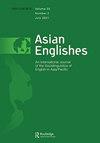全球英语和发展自己的声音的教学挑战
IF 1.8
Q1 LINGUISTICS
引用次数: 4
摘要
标准英语(SE)偏好根深蒂固地根植于许多英语教师的态度和实践中,已被认为是阻碍说语学习者发展解放的全球英语(GE)和通用英语(ELF)交际能力的主要问题。这篇文章从社会建构主义的角度阐述了所涉及的问题,根据这一观点,口语学习者通过在他们的思想、心灵和行为中发展自己的英语版本来习得所教的语言。定向和指导是通过他们对交际和集体成功的要求以及他们对说话者满意度的追求来调节的。关键不在于教的是什么英语,而在于允许和鼓励说英语的人用英语做什么。跨文化虚拟交流使不同语言文化背景的英语学习者能够将英语作为教学通用语言进行交流。沟通监控和教学指导帮助他们发展自己的声音。简而言之,GE/ELF教学法遇上了英语教学!本文章由计算机程序翻译,如有差异,请以英文原文为准。
Global Englishes and the pedagogical challenge of developing one’s own voice
ABSTRACT The Standard English (SE) preference firmly anchored in many English teachers’ attitudes and practices has been identified as a major problem hindering speaker-learners from developing competence for emancipated Global Englishes (GE) and English as a lingua franca (ELF) communication. The article addresses the issues involved from a social constructivist perspective according to which speaker-learners acquire the language taught by developing their own MY English version in their minds, hearts, and behavior. Orientation and guidance are mediated through their requirements of communicative and communal success and their quest for speaker satisfaction. Critical is not the English taught but what speaker-learners are allowed and encouraged to do with it. Intercultural virtual exchanges enable ELT students of different linguacultural backgrounds to communicate with each other using their English as a pedagogical lingua franca. Communication monitoring and pedagogical mentoring help them develop their own voice. In short, GE/ELF pedagogy meets ELT!
求助全文
通过发布文献求助,成功后即可免费获取论文全文。
去求助
来源期刊

Asian Englishes
LINGUISTICS-
CiteScore
3.30
自引率
18.80%
发文量
34
期刊介绍:
Asian Englishes seeks to publish the best papers dealing with various issues involved in the diffusion of English and its diversification in Asia and the Pacific. It aims to promote better understanding of the nature of English and the role which it plays in the linguistic repertoire of those who live and work in Asia, both intra- and internationally, and in spoken and written form. The journal particularly highlights such themes as: 1.Varieties of English in Asia – Including their divergence & convergence (phonetics, phonology, prosody, vocabulary, syntax, semantics, pragmatics, discourse, rhetoric) 2.ELT and English proficiency testing vis-a-vis English variation and international use of English 3.English as a language of international and intercultural communication in Asia 4.English-language journalism, literature, and other media 5.Social roles and functions of English in Asian countries 6.Multicultural English and mutual intelligibility 7.Language policy and language planning 8.Impact of English on other Asian languages 9.English-knowing bi- and multilingualism 10.English-medium education 11.Relevance of new paradigms, such as English as a Lingua Franca, to Asian contexts. 12.The depth of penetration, use in various domains, and future direction of English in (the development of) Asian Societies.
 求助内容:
求助内容: 应助结果提醒方式:
应助结果提醒方式:


